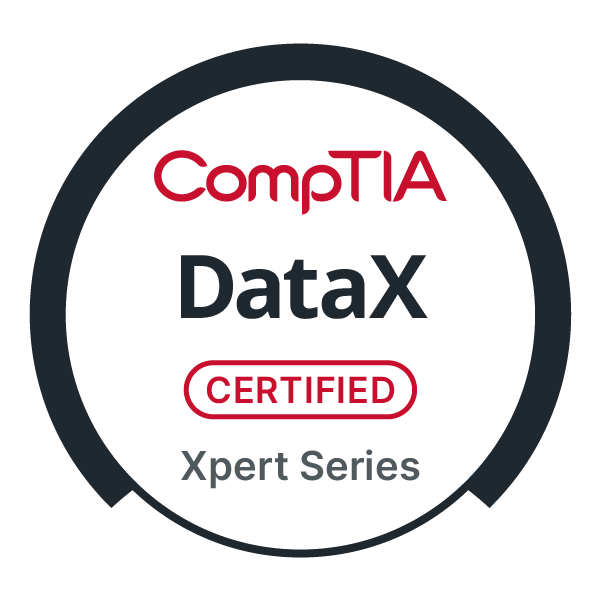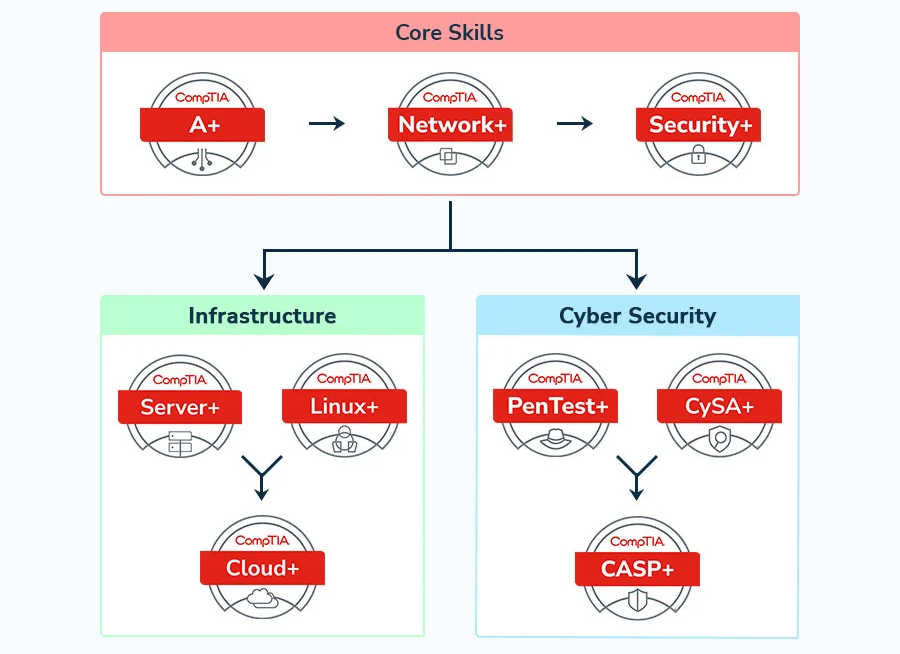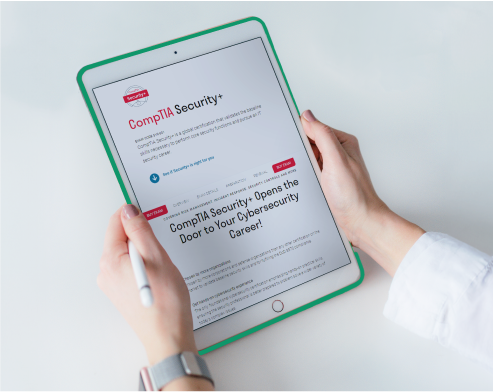Explore All CompTIA Certifications
CompTIA certifications: The Computing Technology Industry Association (CompTIA) is a vendor-neutral IT certifications company that is recognized globally and is the most reputable in the technology industry. CompTIA certifications are the confirmation of the necessary skills in IT basics, networking, cybersecurity, cloud, and other fields. If you are starting your IT career or searching for a field to specialize in, CompTIA has a certification path that is complete and customized according to your goals.
There are four main categories in which the CompTIA certifications are divided: Core, Infrastructure, Cybersecurity, and Additional Professional Certifications. Each of them corresponds to the skills proven in practice that employers require.
- Core Certifications:Foundational knowledge for any IT role (e.g., ITF+, A+, Network+, Security+)
- Infrastructure Certifications:Specialized in cloud, server, and networking technologies (e.g., Linux+, Server+, Cloud+)
- Cybersecurity Certifications:Deep dive into security roles and practices (e.g., CySA+, PenTest+, CASP+)
- Professional Certifications:Project management and data analysis roles (e.g., Project+, Data+)
Cloud Certifications

Cloud+
Earn AWS SysOps Associate certification to excel in cloud operations. Manage, deploy, and optimize AWS systems with proven expertise.
Cyber Certifications

CASP+
Earn AWS SysOps Associate certification to excel in cloud operations. Manage, deploy, and optimize AWS systems with proven expertise.

CySA+
Earn AWS SysOps Associate certification to excel in cloud operations. Manage, deploy, and optimize AWS systems with proven expertise.

PenTest+
Earn AWS SysOps Associate certification to excel in cloud operations. Manage, deploy, and optimize AWS systems with proven expertise.

Security+
Earn AWS SysOps Associate certification to excel in cloud operations. Manage, deploy, and optimize AWS systems with proven expertise.

SecurityX
Earn AWS SysOps Associate certification to excel in cloud operations. Manage, deploy, and optimize AWS systems with proven expertise.
Data

Data+
Earn AWS SysOps Associate certification to excel in cloud operations. Manage, deploy, and optimize AWS systems with proven expertise.

DataX
Earn AWS SysOps Associate certification to excel in cloud operations. Manage, deploy, and optimize AWS systems with proven expertise.
Digital Skills

Project+
Earn AWS SysOps Associate certification to excel in cloud operations. Manage, deploy, and optimize AWS systems with proven expertise.
Network

Linux+
Earn AWS SysOps Associate certification to excel in cloud operations. Manage, deploy, and optimize AWS systems with proven expertise.

Network+
Earn AWS SysOps Associate certification to excel in cloud operations. Manage, deploy, and optimize AWS systems with proven expertise.

Server+
Earn AWS SysOps Associate certification to excel in cloud operations. Manage, deploy, and optimize AWS systems with proven expertise.
Tech Support

A+
Earn AWS SysOps Associate certification to excel in cloud operations. Manage, deploy, and optimize AWS systems with proven expertise.
Enquire Now
More Trainings
CompTIA Certifications Path Explained
IT professionals can use CompTIA’s certification roadmap to get guidance on a clear learning progression covering every step of their careers. The structured road map of CompTIA is there, no matter if you are new and heading towards a specialized security role, as it helps you develop skills at the right time.
The first step is usually taking CompTIA IT Fundamentals (ITF+), which is aimed at complete beginners or career changers and helps them to go through basic IT literacy. Next, candidates usually move to Core certifications such as CompTIA A+, which deals with hardware, troubleshooting, and support, or Network+, which is about networking concepts and infrastructure. Security+ is often the next step, which sets a basis for a cybersecurity skills market.
After learning and comprehending the core concepts, the Infrastructure road leads over to certifications as Linux+, Cloud+, and Server+, which are suitable for system administrators and infrastructure engineers. These certifications introduce advanced topics of particular operating systems and platforms.
The Cybersecurity path includes CompTIA CySA+ (Cybersecurity Analyst), PenTest+ (Penetration Tester), and CASP+ (Advanced Security Practitioner), tailored for those who concentrate on protecting systems, finding loopholes, and reacting to cyberattacks.
Finally, CompTIA provides professionals with credentials, such as the Project+, which is for project management, and Data+ for data analysis, which are the roles that require IT fluency in non-technical disciplines.

How to Prepare and Get CompTIA Certified in CompTIA certifications
CompTIA certifications exams require a combination of studying, practicing, and knowing the format of the exam. The key to passing a CompTIA test is that each exam is unplugged to demonstrate real-world knowledge and skills, so the candidates must be hands-on and well-organized in their work.
Firstly, get the official exam objectives from the CompTIA website. These outlines offer a detailed view of the topics, weightage, and concepts you'll be tested on. Then choose a training tool you trust - the list includes online resources such as CompTIA CertMaster, LinkedIn Learning, Udemy, and books by authors approved by CompTIA.
Practical work is an indispensable part of the learning process. It is still important that, even when simulators or labs are used, you have a clear idea of the troubleshooting, installation, configuration, and security that you perform since they are the frequently required skills in A+ or Network+, or Security+ exams. The virtual lab is available on some platforms where one can simulate a real-time scenario and practice.
The tests made after practice and rehearsal will allow you to judge your preparedness and get familiar with the time limit and the style of questions. Plan to go over your weak spots, do the tests again, and use flashcards or form a study group for better comprehension.
CompTIA exams are carried out via Pearson VUE and can be done in a physical testing center or online through remote proctoring. After you have done all the work, it is time to plan your exam and take the last stride towards certification, with good preparation and a clear understanding of IT principles.
Career Opportunities After CompTIA Certification

Employers recognize CompTIA certifications, and they can be your passport for various career opportunities in IT and cybersecurity. A support position is one of those jobs that are at an entry-level, or becoming a senior security analyst, the spectrum of certifications offered by CompTIA has one that fits your ambition.
Firstly, by earning CompTIA A+, you can get jobs such as IT Support Specialist, Desktop Technician, or Help Desk Analyst, which allow you to have hands-on experience with IT systems. Getting Network+ can help you become a Network Administrator or Infrastructure Technician, and Security+ can be your launchpad into cybersecurity as a Security Analyst or Information Security Officer.
Having the advanced credentials in CySA+, PenTest+, or CASP+, you are able to specialize in the field of Threat Intelligence Analyst, Ethical Hacker, or Security Architect work, for example. Professionals who are certified in infrastructure, such as Linux+ or Server+, frequently find themselves selected for jobs like Systems Administrator, Cloud Operations Engineer, or Data Center Technician.
CompTIA is also good for professionals who are working in related fields. Project+ is suitable for IT project coordinators and team leads, while Data+ fits those who are engaged in data governance, analysis, and business intelligence roles.
Since CompTIA certifications are vendor-neutral, they are accepted all over the world and can be used in a variety of IT settings. This ability to move around allows certified professionals to work in different industries such as healthcare, finance, government, education, and technology.
Global Recognition and Industry Demand for CompTIA Certifications
Certification from CompTIA is known all over the world, and they are the gold standard for the skills validation of the IT practical sphere. CompTIA certifications are present in more than 100 countries and are backed by thousands of employers. Those who trust the organizations use CompTIA as a certification to check the competency of their IT workforce.
The need for IT professionals is constantly going up, and employers are now more and more relying on certifications that prove the skills in practice on different platforms, devices, and environments. A big advantage of CompTIA is that it is neutral in terms of vendors; thus, people who have the certificate can work anywhere in the IT infrastructure—this makes them highly adaptable and valuable to companies of any size.
CompTIA certifications not only give you credibility and technical skills but also make you more employable and increase your salary by improving the job market you are in. For instance, A+, Network+, and Security+ are often required in the job descriptions for different IT roles, and having these credentials will make your chances of being shortlisted for an interview much higher.
Those are the points, no matter whether a professional or a student who seeks to protect their future job in a rapidly changing market and get an advantage among the competitors can realize through CompTIA certifications, which give a flexible and respected track for career growth approved by the industry.